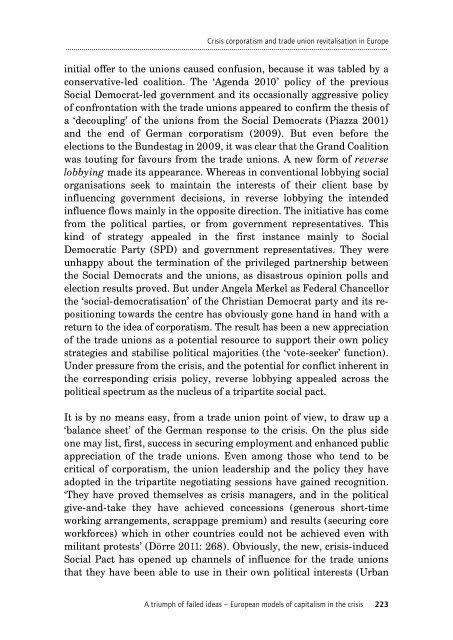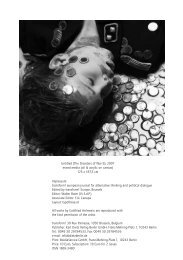A triumph of failed ideas European models of capitalism in ... - Journal
A triumph of failed ideas European models of capitalism in ... - Journal
A triumph of failed ideas European models of capitalism in ... - Journal
You also want an ePaper? Increase the reach of your titles
YUMPU automatically turns print PDFs into web optimized ePapers that Google loves.
Crisis corporatism and trade union revitalisation <strong>in</strong> Europe.................................................................................................................................................................<strong>in</strong>itial <strong>of</strong>fer to the unions caused confusion, because it was tabled by aconservative-led coalition. The ‘Agenda 2010’ policy <strong>of</strong> the previousSocial Democrat-led government and its occasionally aggressive policy<strong>of</strong> confrontation with the trade unions appeared to confirm the thesis <strong>of</strong>a ‘decoupl<strong>in</strong>g’ <strong>of</strong> the unions from the Social Democrats (Piazza 2001)and the end <strong>of</strong> German corporatism (2009). But even before theelections to the Bundestag <strong>in</strong> 2009, it was clear that the Grand Coalitionwas tout<strong>in</strong>g for favours from the trade unions. A new form <strong>of</strong> reverselobby<strong>in</strong>g made its appearance. Whereas <strong>in</strong> conventional lobby<strong>in</strong>g socialorganisations seek to ma<strong>in</strong>ta<strong>in</strong> the <strong>in</strong>terests <strong>of</strong> their client base by<strong>in</strong>fluenc<strong>in</strong>g government decisions, <strong>in</strong> reverse lobby<strong>in</strong>g the <strong>in</strong>tended<strong>in</strong>fluence flows ma<strong>in</strong>ly <strong>in</strong> the opposite direction. The <strong>in</strong>itiative has comefrom the political parties, or from government representatives. Thisk<strong>in</strong>d <strong>of</strong> strategy appealed <strong>in</strong> the first <strong>in</strong>stance ma<strong>in</strong>ly to SocialDemocratic Party (SPD) and government representatives. They wereunhappy about the term<strong>in</strong>ation <strong>of</strong> the privileged partnership betweenthe Social Democrats and the unions, as disastrous op<strong>in</strong>ion polls andelection results proved. But under Angela Merkel as Federal Chancellorthe ‘social-democratisation’ <strong>of</strong> the Christian Democrat party and its reposition<strong>in</strong>gtowards the centre has obviously gone hand <strong>in</strong> hand with areturn to the idea <strong>of</strong> corporatism. The result has been a new appreciation<strong>of</strong> the trade unions as a potential resource to support their own policystrategies and stabilise political majorities (the ‘vote-seeker’ function).Under pressure from the crisis, and the potential for conflict <strong>in</strong>herent <strong>in</strong>the correspond<strong>in</strong>g crisis policy, reverse lobby<strong>in</strong>g appealed across thepolitical spectrum as the nucleus <strong>of</strong> a tripartite social pact.It is by no means easy, from a trade union po<strong>in</strong>t <strong>of</strong> view, to draw up a‘balance sheet’ <strong>of</strong> the German response to the crisis. On the plus sideone may list, first, success <strong>in</strong> secur<strong>in</strong>g employment and enhanced publicappreciation <strong>of</strong> the trade unions. Even among those who tend to becritical <strong>of</strong> corporatism, the union leadership and the policy they haveadopted <strong>in</strong> the tripartite negotiat<strong>in</strong>g sessions have ga<strong>in</strong>ed recognition.‘They have proved themselves as crisis managers, and <strong>in</strong> the politicalgive-and-take they have achieved concessions (generous short-timework<strong>in</strong>g arrangements, scrappage premium) and results (secur<strong>in</strong>g coreworkforces) which <strong>in</strong> other countries could not be achieved even withmilitant protests’ (Dörre 2011: 268). Obviously, the new, crisis-<strong>in</strong>ducedSocial Pact has opened up channels <strong>of</strong> <strong>in</strong>fluence for the trade unionsthat they have been able to use <strong>in</strong> their own political <strong>in</strong>terests (UrbanA <strong>triumph</strong> <strong>of</strong> <strong>failed</strong> <strong>ideas</strong> – <strong>European</strong> <strong>models</strong> <strong>of</strong> <strong>capitalism</strong> <strong>in</strong> the crisis 223








